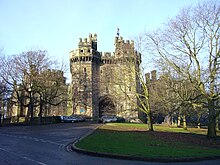Pendle witch trials

The Pendle witch trials took place in 1612 and are among the most famous and best documented in English history .
The twelve defendants who in the area around Pendle Hill in the county of Lancashire survived the execution were accused of ten murders. One person died in custody, the other - nine women and two men - were in Lancaster and a defendant on July 27, 1612 York the process done. The court of asses in Lancaster from 18./19. August 1612 negotiated several witch trials, which are now known as the Lancashire witch trials . Ten of the Pendle Hill accused were found guilty and hanged and one acquitted.
The number of death sentences imposed and the official publication of the trials by court clerk Thomas Potts under the title The Wonderfull Discoverie of Witches in the Countie of Lancaster were unusual for England at the time, where there were only isolated outbreaks of witch persecution, a total of around 500 People fell victim.
James William Harrison Ainsworth addressed the Pendle witch trials in his 1848 novel The Lancashire Witches . In the crime novel The Curse of Pendle Hill: A Case for Frey & McGray (2016) by Oscar de Muriel , references to the Pendle witch trials are made in the storyline.
Individual evidence
- ↑ Witches. In: Lancashire Museum website. Lancashire County Council, archived from the original on May 30, 2013 ; accessed on April 20, 2016 (English).
- ^ Diarmaid MacCulloch : The Reformation . 1490-1700. Deutscher Taschenbuch Verlag , Munich 2010, ISBN 978-3-423-34653-5 , pp. 731 (English: Reformation.Europe's House Divided. 1490-1700 .).
- ↑ Historisches Museum der Pfalz Speyer (Ed.): Witches . Myth and Reality. Edition Minerva Hermann Farnung, Munich 2009, ISBN 978-3-938832-54-7 , p. 182 (book for the exhibition of the same name).
